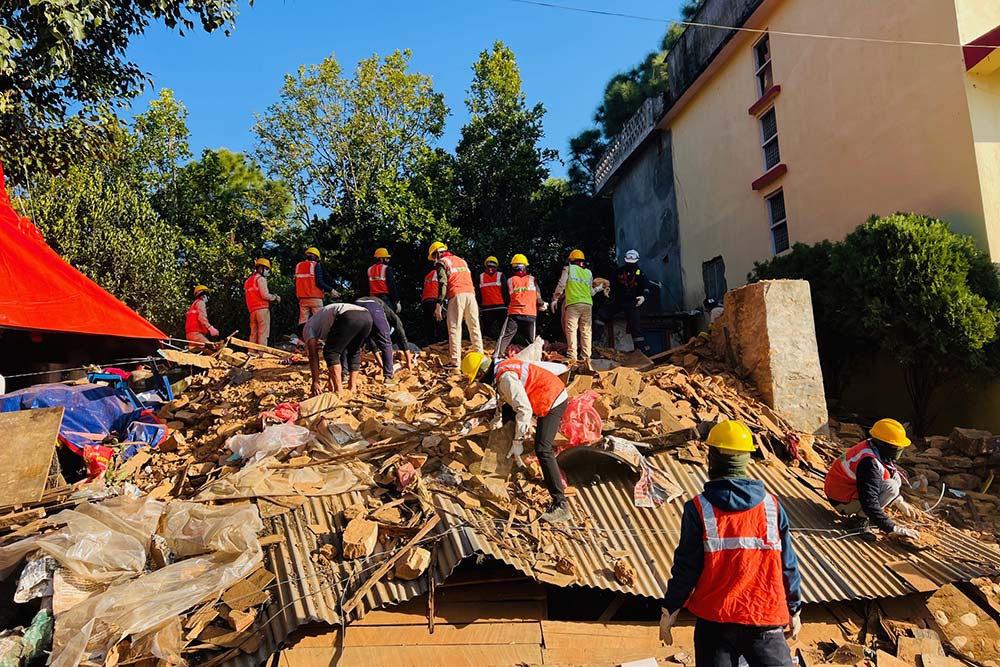
Nepal is stepping ahead to graduate to the league of developing countries by 2022 at a time when the country’s economic vulnerabilities are rising due to job loss, closure of large numbers of cottage, micro and small industries, interruption in supply chain due to plummeting demand led by income shocks.
The country’s private sector is clear that the government should defer the process at least to the next triennial review in 2024. The FNCCI has argued this is not the right time to graduate to the league of developing nations when the country’s economy is shattered by the Covid 19 pandemic and urged the government to understand the ground reality rather than being optimistic with the data of previous two initial triennial reviews after 2015.
“Out of the three criteria required for LDC graduation, Nepal has fulfilled two, the Economic Vulnerability Index and Human Assets Index, both in the 2015 and 2018 triennial review, such that Nepal fulfilled the criteria for graduation despite a low level of gross national income per capita”, according to Prof. Puspa Raj Kadel, Vice Chairperson of the National Planning Commission, adding “Due to economic and structural gaps and vulnerabilities stemming from natural disasters, Nepal’s graduation was deferred by the Committee for Development Policy in 2018.”
Kadel denotes that the country is under moral pressure as it has been continuously deferring the graduation process. The Committee for Development Policy (CDP), a subsidiary body of the Economic and Social Council (ECOSOC) will conduct the review this year. According to experts the CDP will recommend the graduation within the stipulated timeframe of 2022 as the country has already achieved the criteria of LDC graduation.
Nepal’s Human Assets Index (HAI) stands at 71.2 against the required 66 whereas the Economic Vulnerability Index (EVI) is required to be below 32 and Nepal’s EVI is 28.4. However, per capita income of Nepali’s is below the threshold of the requirement of $1,222. Despite the per capita income being below the threshold at $1,058, the United Nations Authorities have already said in 2018 that Nepal can be graduated ‘technically’.
The private sector is opposing the idea considering the economic depression caused by the pandemic. A recent report published by the Ministry of Industry, Commerce and Supplies reveals that 10.81% of the industries are closed after the Covid 19 pandemic, and 75% of the industries closed following the pandemic are cottage, micro and small industries, while most industries are being operated below capacity.
The country’s economic growth was almost ‘nil’ in 2019-20 and it is expected to grow marginally at 0.6% in this fiscal. “It is an irony that the government is trying to develop this status rather than help the cottage and small industries to firmly stand again from the rubble”, Shekhar Golchha, President of FNCCI has said elaborating, “Once we receive a tag of developing nation, we will have to maintain the status, otherwise it will be shameful for the country.”
Rising economies of the South Asian region, Bhutan and Bangladesh have planned to graduate in 2023 and 2024 respectively as these countries have strong propelling sectors to retain the growth. Bhutan has harnessed its hydroelectricity potential and is selling in the Indian market, and it has focused on quality tourism. Likewise, Bangladesh has a strong manufacturing base, garment is the leading industry and the country is also performing well in the production of pharmaceutical products. Export of garments from Bangladesh alone was $35 billion dollars in the 2019, which is more than Nepal’s gross domestic product (GDP).
The major reason behind the concern of the private sector is that Nepal may lose preferential market access through generalised system of preferences (GSP) as least developed country (LDC). The private sector believes that economic vulnerability will rise from probable decline in exports. Nepal has been struggling since a decade to achieve its $1 billion export target. The United States has been importing traditional Nepali products that include handmade carpet, handicraft products among others under the GSP. The United States is the third largest export destination after India and Europe. Likewise, Europe has been providing preferential market access through EBA (everything but arms) facilities to LDCs. Nepal will certainly lose these facilities after the transition of two years following the graduation. Nepal will then have to compete with the products of other countries in export destination with tariffs that importing countries will levy on the products of other countries. Developed Countries are spending 0.1% of the GDP as ODA (official development assistance) that mostly being sent to the 46 LDCs including Nepal to uplift their socio-economic status.
It is assumed that 9% of the tariff will rise in Nepal’s total export after the graduation.
Similarly, bilateral aid which is providing necessary impetus in Nepal’s development process will be affected. “There will not be impact in concessional financing from multilateral development partners like World Bank, Asian Development Bank, International Monetary Fund, however we will not be eligible for concessional financing from bilateral donors,” said Senior Economist Dr. Dilli Raj Khanal, “World Bank’s concessional financing window is available for low-income countries and Nepal can avail concessional loan until it remains under the category of low income country.” Nepal has targeted to become a middle-income country by 2030, however, it seems a herculean task due to pandemic. The World Bank has said that the country must keep 7-8% growth every year to achieve the target to be a middle-income country by 2030.
The private sector is also worried regarding the agreement on Trade-Related Aspects of Intellectual Property Rights (TRIPS) as around 50 pharmaceutical industries are in operation in Nepal. Though, it has been agreed that TRIPS will be enforced only after 2033, it is not clear if Nepal’s graduation to developing nation will affect the domestic pharmaceutical industries or not. There is no doubt that the country needs to develop a strong intellectual property regime, but it could take time as Nepal was enjoying relaxation as LDC.
Economist Nara Bahadur Thapa opines that it will be an upsetting scenario for the country if we have to revoke the achievement after a few years of graduation. “The country must have a propelling factor to boost its economic growth, “ said Thapa citing the example of Maldives, Samoa and Equatorial Guinea’s recent graduation, “The propelling factor comes from either exploitation of natural resources that provides sustainable and competitive manufacturing base and also through promotion of service industry like tourism, education or medical services.”
Nepal’s graduation process is led by remittances and labour market conditions could severely impact this, according to Thapa.
It could be a matter of sensitivity during Nepal’s triennial review from the Committee for Development Policy under the ECOSOC that the country ranked 73rd among 117 in the 2019 Global Hunger Index. The climate change impacts have posed risk to the country’s agriculture production but the government has not seriously pondered the possible threats on Human Assets Index. The Food and Nutrition Safety Division of the Ministry of Agriculture and Livestock Development has discontinued the process of mapping food-insecure places based on the database of crops and production at the time when the Global Hunger Index revealed the alarming scenario.
“Earlier, the World Food Organisation had supported the ministry to map food insecure places caused by the drought, natural disasters (flood, landslides), supply of low-quality seeds and climate change impacts so that the government could intervene with food and nutrition programs,” observed Shree Ram Ghimire, Spokesperson and Joint Secretary of the Ministry.
However, once the WFP’s project was closed, the Ministry could not continue the important initiative that could help the government to improve the ranking in Global Hunger Index in the future through ensuring food and nutrition safety. People might interpret such incidents as aid dependency of government mechanisms, however according to experts Nepal needs foreign assistance to build its competence, skills and capacity to continue such initiatives to retain the achievements of the socio-economic front as well as develop country’s resilience against climate change impacts. The LDC graduation will certainly impact flow of aid that the country has been receiving from developed countries and UN agencies. The country must develop resilience from the impact of climate induced disasters which could destroy the achievements on the socio-economic front.
The private sector woes the repercussions of the LDC graduation which seem to be unheeded as the government seems determined to graduate to the league of the developing nations by 2022.
“The private sector can just suggest and present the ground reality, but it is up to the government whether to consider the private sector’s proposal or not,” Golchha reiterated, “I urge the government to think about sustainable graduation.”
Published Date: February 23, 2021, 12:00 am
Post Comment
E-Magazine
RELATED Feature





